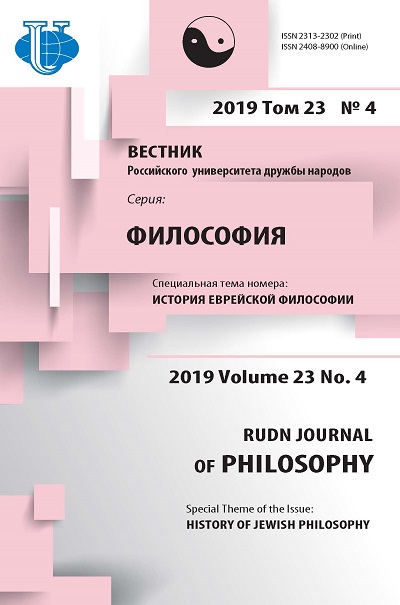Jewish philosophy as a Direction of the World philosophy of Modern and Contemporary Times
- Authors: Dvorkin I1
-
Affiliations:
- Hebrew University of Jerusalem
- Issue: Vol 23, No 4 (2019): HISTORY OF JEWISH PHILOSOPHY
- Pages: 430-442
- Section: History of Jewish Philosophy
- URL: https://journals.rudn.ru/philosophy/article/view/22610
- DOI: https://doi.org/10.22363/2313-2302-2019-23-4-430-442
- ID: 22610
Cite item
Full Text
Abstract
This article represents an analysis of the Jewish philosophy of the Modern and Contemporary as the holistic phenomenon. In contrast to antiquity and the Middle Ages, when philosophy was a rather marginal part of Jewish thought, in Modern Times Jewish philosophy is formed as a distinct part of the World philosophy. Despite the fact that representatives of Jewish philosophy wrote in different languages and actively participated in the different national schools of philosophy, their work has internal continuity and integrity. The article formulates the following five criteria for belonging to Jewish philosophy: belonging to philosophy itself; reliance on Jewish sources; the addressee of Jewish philosophy is an educated European; intellectual continuity (representatives of the Jewish philosophy of Modern and Contemporary Periods support each other, argue with each other and protect each other from possible attacks from other schools); working with a set of specific topics, such as monism, ethics and ontology, the significance of behavior and practical life, politics, the problem of man, intelligence, language and hermeneutics of the text, Athens and Jerusalem, dialogism. The article provides a list of the main authors who satisfy these criteria. The central ones can be considered Baruch (Benedict) Spinoza, Moshe Mendelssohn, Shlomo Maimon, German Cohen, Franz Rosenzweig, Josef Dov Soloveichik, Leo Strauss, Abraham Yehoshua Heshel, Eliezer Berkovich, Emil Fackenheim, Mordechai Kaplan, Emmanuel Levinas. The main conclusion of the article is that by the end of the 20th century Jewish philosophy, continuing both the traditions of classical European philosophy and Judaism, has become an important integral part of Western thought.
About the authors
I Dvorkin
Hebrew University of Jerusalem
Email: idvorkin@mail.ru
Mt. Scopus, Jerusalem, Israel, 9190501
References
- נימרק, דוד, תולדות הפילוסופיה בישראל: על פי סדר המחקרים. מאת דוד בן שלמה נימרק. ניו יורק ; ווארשה ; מוסקבה : א.י. שטיבל, תרפ"א-תרפ"ט
- Guttmann J. Die Philosophie des Judentums. München: E. Reinhardt, 1933.
- Agus J. London-New-York, 1959.
- Wolfson HA. Studies in the history of philosophy and religion. Cambridge: Harvard University Press, 1973-1977.
- History of Jewish philosophy. (Routledge history of world philosophies 2). Daniel H. Frank Oliver Leaman (Hg.). London; 1997.
- Hayoun Maurice-Ruben. Geschichte der jüdischen Philosophie. WBG: Darmstadt; 2004.
- The Cambridge History of Jewish Philosophy. Volume 1. Steven Nadler and T.M. Rudavsky; Cambridge University Press, 2008.
- Shatz D. Jewish thought in dialogue: essays on thinkers, theologies, and moral theories. Brighton, MA: Academic Studies Press; 2009.
- New Directions in Jewish Philosophy. Paperback. Aaron W. Hughes (Editor), Elliot R. Wolfson (Editor). Indiana University Press; 2009.
- Schweid E. A history of modern Jewish religious philosophy by Eliezer Schweid. Translation by Leonard Levin. Leiden; Boston: Brill; 2011.
Supplementary files















